#魏嬰
Explore tagged Tumblr posts
Text

季節遅れの春。
14 notes
·
View notes
Text
✨💞
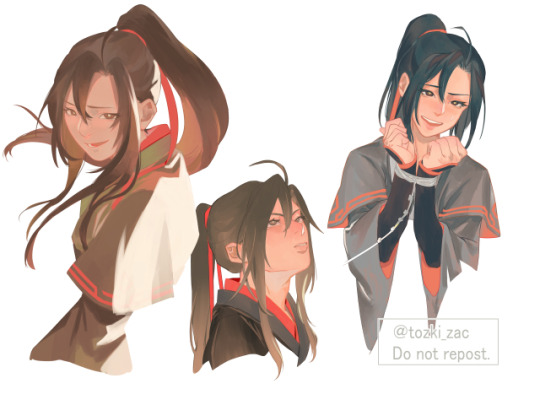
#the grandmaster of demonic cultivation#mo dao zu shi#mdzs#gdc#cql#wei wuxian#wwx#yiling patriarch#魏嬰#not my fanart
2K notes
·
View notes
Text
For those who want to see the full translation of Lan Wangji’s invitation letter to Wei Wuxian at episode 31, here you go.
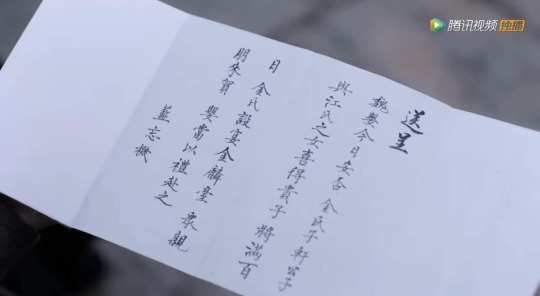
Written letter:
送呈
魏嬰今日安否 金氏子軒公子與江氏之女喜得貴子 將滿百日 金氏設宴金��臺 眾親朋來賀 嬰當以禮赴之
藍忘機
Translation:
To submit
Wei Ying, are you well today? Young Master Zixuan of the Jin clan and Lady Jiang have been blessed to have a son, who is about to reach a hundred days. The Jin clan will hold a banquet in Jinlintai (Koi Tower). A lot of relatives and friends will come to celebrate. According to the ritual, Ying should attend.
Lan Wangji
The lovely thing here is that, lwj started the letter with, “are you well today?” showing his concern to wwx in the most formal way, telling him ‘I’m here, I’m still by your side. Are you okay? 🥺’ He even dropped wwx’s surname and directly called him ‘Ying’ 😭 If this was wwx, he would 100% call lwj ‘Zhanzhan’ or ‘A-Zhan’ 😭
Detailed explanation of the letter under the cut—
送呈 - submit
送呈: submit; to give to whomever is going to read
魏嬰今日安否 - Wei Ying, are you well today?
魏嬰: Wei Ying; Wei Wuxian’s birth name
今日: today
安否: safety; welfare; well-being
金氏子軒公子與江氏之女喜得貴子 - Young Master Zixuan of the Jin clan and Lady Jiang have been blessed to have a son
金氏: Jin clan; Jin Family
子軒: Zixuan; courtesy name without the surname
公子: young master
與: and; together with
江氏: Jiang clan; Jiang Family
之女: daughter; lady
喜: happy; delighted; pleased; blessed
得: get; obtain; gain
貴子: son
將滿百日 - almost fill a hundred days
將: be going to; be about to; will; shall
滿: full; fill; complete; reach
百: hundred (automatically means one hundred if there are no numbers written before)
日: day
金氏設宴金麟臺 - The Jin clan will hold a banquet in Jinlintai
金氏: Jin clan; Jin Family
設宴: hold a banquet/celebration/festival
金麟臺: (place) Jinlintai; Koi Tower
眾親朋來賀 - A lot of relatives and friends will come to celebrate
眾: many; numerous
親朋: relatives and friends (親屬: relatives; 朋友: friends)
來: come; attend
賀: celebrate; congratulate
I have doubts with the last sentence [[follow the colors to see which translation goes to which]]
嬰當以禮赴之 - Ying should be treated with courtesy if he will attend // According to the ritual, Ying should attend
嬰: Ying, Wei Wuxian’s birth name without the surname
當: ought to; should; must; treat as; regard as
以: with; by means of; according to
禮: courtesy; politeness; ritual
赴: go to; attend
藍忘機 - Lan Wangji
藍忘機: Lan Wangji; courtesy name
#for the chinese learners this is for u#if i have a mistake feel free to correct me 🫣#note that this is classical chinese and it’s hard for me to understand it isbxoajx 😭#the untamed#cql#lan wangji#lan zhan#wei wuxian#wei ying#wangxian#my useless essays#my chinese translations
338 notes
·
View notes
Text
☆ Wei Wuxian's names etymology
Here's a complete post on the etymology of our beloved Wei Wuxian's various names. I've always appreciated how authors would give out names that fit their characters so well, which is why I chose to share this.
▷ Wei Wuxian Master Profile.
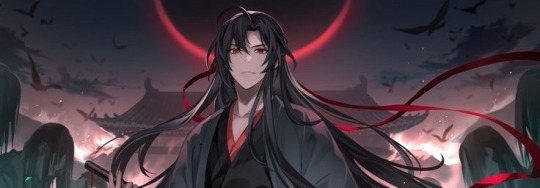
Birth Name - Wei Ying 魏嬰
Wei 魏 (wèi) – tower over a palace gateway; from the radicals 鬼 "ghost" & 委 "entrust/shift". His surname Wei primitively meant “ghosts and spirits” (the radical 委 means spirit and 鬼 means ghost). After it became a royal family name, it is to this day used to describe something as “grand, tall, or mighty”. The surname Wei is familiar to history majors, as it’s one of the three nation-states in the Three Kingdoms Period. The original meaning of the word 魏 is grand and majestic – the left half of that character means god or entrust, while the right half means ghost. Fitting surname for a grandmaster who deals with the deceased.
Ying 嬰 (yīng) - infant. Wei Ying’s formal name Ying 嬰 literally means babe. In ancient times it used to also refer to necklaces. Historically there are at least a handful of well-known figures with that name. The Taoist term YuanYing 元嬰 refers to a state of primordial transcendence, often considered an intermediate phase on the path toward deity WWX’s birth name Ying (婴) commonly means “infant”. Another meaning for Ying is “to pester, to touch”. This second meaning derives from a famous piece of literature by Western Jin Dynasty official and writer Li Mi called 「陈情表」 (chén qíng biǎo). The first two words 陈情 are also the name of WWX’s flute. The work describes the story of Li Mi’s grandmother’s great sacrifice to bring him up and his determination to repay her. Today it is one of the most famous literary works for teaching new generations about filial piety, a key Confucian virtue. Even though 陈情 on the surface has two meanings, (1) “to convey one’s inmost feelings”(abbreviation of 陈述衷情) and (2) “former relationship” (abbreviation of 陈旧的情义).
Birth name is rarely used by anyone other than close family members, teachers, and elders in the family, clan, or sect. Using it implies either a certain type of intimacy or a certain type of seniority over the person being spoken to.
Courtesy Name - Wei Wuxian 魏无羨
WuXian 无羨 (wúxiàn) – to have no envy Wu 无 means none, nil, the lack of Xian 羨 means envy. Wuxian is a perfect name for someone who embodies the untamed, envious of none. His outlook on life is never to bemoan his fate, come what may. He doesn’t know the meaning of jealousy. He is complete in and of himself. His courtesy name Wuxian comes from the last line of a poem by Ming Dynasty literati Xu Ben. “即无羡鱼志,外物非所迁” (jí wú xiàn yú zhì, wài wù fēi suǒ qiān) translates as “to be free of envy and aspire to greater heights; not be misguided by honorary reputation and personal gain”.
即 - to seek; aspire. 无羡 - to be free of envy. 鱼志 - derives from the Chinese idiom 鲲鹏之志, originating from a literary work by Chinese philosopher Zhuangzi meaning “to be ambitious”. 外物 - literally means “objects external to the body”, now used to describe personal gain and external honors. 迁 - misguide; led by.
The courtesy name, in The Untamed, is given early on. In many wuxia/xianxia novels, characters don’t receive their courtesy name until they are adults. This is a name friends, acquaintances, and peers (those of equal standing) use.
Title - Yiling Patriarch / Laozu 夷陵老祖
Yiling 夷陵 (yílíng) – a place; 'barbarian mound' YiLing is simply a place name, literally the Yi Hill. However, it sounds a lot more sinister and ghastly in the original language because of the connotations. The character Yi is historically used to refer to barbarous and uncivilized regions to the east of ancient China, while the character Ling refers to hills and mounds of dirt that are often associated with mausoleums. Yeah, it sounds worse than it looks in the show.
Laozu 老祖 (lǎozǔ) – patriarch Laozu doesn’t have anything to do with patriarchy, since the original Chinese is a unisex term. The characters separately mean “old” and “ancestor” but the combined term is typically used about the founder of a religious sect.
This title is about Wei Ying’s place of origin where a grandmaster established himself (people are starting to forget he was from YunMeng originally because they’re so fearful of him) and his unorthodox powers (he’s the first one to successfully harness the dark arts). The reverence is inseparable from abhorrence.
The title is just what it says on the box. It is used to express respect, but also a certain amount of distance.
Would anyone be interested in Mo Xuanyu's name etymology?
Author Note: I am not an expert in Chinese at all, English isn't my native language either - I hope everything is correct.
▷ MDZS Home Page
[ completed ; 17/07/2024]
★ ⁺. ໒꒰ྀི。- ˕ -。꒱ྀི১ ૮꒰˶ᵔ ᗜ ᵔ˶꒱ა ˖⁺‧₊˚
#the untamed#mo dao zu shi#wei ying#wei wuxian#lan zhan#lan wangji#hanguang jun#yilling patriarch#mdzs manhua#mdzs novel#mdzs#the grandmaster of demonic cultivation#cql#the untamed etymology#wei wuxian names#wei wuxian etymology#the untamed names#mdzs names#etymology#mdzsxperience
51 notes
·
View notes
Text

終於...藍二哥哥把要送給魏嬰的愛織好了🥰
羨:藍湛啊~藍湛!好手藝呀! 機:嗯(喜歡就好)
29 notes
·
View notes
Text
Wei Ying might actually be long-lost royalty (mark 3) but it doesn’t actually mean all that much. Historical tragic, super spicy gay drama! - An Essay (1)
So I’ve been asked: now that we know MDZS happened during Wei Jin Northern and Southern Dynasty era and that the name of one of the dynasties (Northern Wei 北魏) is the same Wei in Wei Ying Wei Wuxian (魏). How come nobody in MDZS ever remarked on Wei Ying having the same surname as the royal family?
There are three reasons for this:
1. The royal house name of Northern Wei was not Wei. It was Yuan… and Tuoba before that.
Yeah…
Northern Wei eventually fractured into East and West Wei, with each branch of the royal family (Yuan and Tuoba branches) taking power on each side.
The other Wei state in the same Six Dynasties Period was Cao Wei. The ruling house name was Cao… as in … Cao Cao… of the Romance of The Three Kingdoms fame… Yeah…
The actual royal house with the Wei surname that you are looking for came from the Wei Kingdom during Warring States (4BCE to 2BCE), i.e., the period of chaos and war right before unification by Qin Shi Huang. I.e., over half a millennium before MDZS timeline (Although this is probably the era when the great Houses were founded: Wen, Jiang, Jin, Nie, and Lan. The book did mention the time before Wen Mao, the founder of House Wen, brought about the fall of the sect system to be a time of wars and chaos and that the Burial Mound was a Holy Mountain that was corrupted due to the countless dead well before Wen Mao’s time).
Wei Kingdom 魏国 started out as a vassal state (called the State of Wei). Through generations of achievements and war alliances, this state evolved to become a Kingdom. The first Wei King was Wei Ying (魏嬰). Yes. That Wei Ying. Although the Ying here is a variation of the way Wei Ying’s birthname is spelled in canon with the meaning remaining the exact same. His posthumous title is Wei Hue Wang (King Wei Hue).
Although if you are looking for the historical counterpart of Wei Ying (and Jiang Cheng), you will have to look three generations down at his great-great-grandson Wei Wuji (Wuji being another way to write Wuxian), also known as Lord Xinling (Xinling Jun). Wei Wuji and his elder brother’s life is more or less what happened to Wei Wuxian and Jiang Cheng Jiang Wangyin in MDZS. Except in the real world, it’s Jiang Cheng who is gay (Bi, really) and whose lover’s title (Lungyang Jun) is used as a way to refer to gay porn for 2000 years after his death. Historical Wei Wuxian still died of a broken heart because his brother betrayed him though. Unlike novel Jiang Cheng, however, historical Jiang Cheng (King Wei Anli, elder brother to Wei Wuji) was said to have died of an illness supposedly caused by hearing his younger brother had died of a broken heart. Fans of tragic, complicated, highly spicy gay romance, eat your heart out.

Ladies and gentlemen: the historical Jiang Cheng, King Wei Anli (in modern Chinese cinema), also the man who introduced gay porn into Chinese literary history.
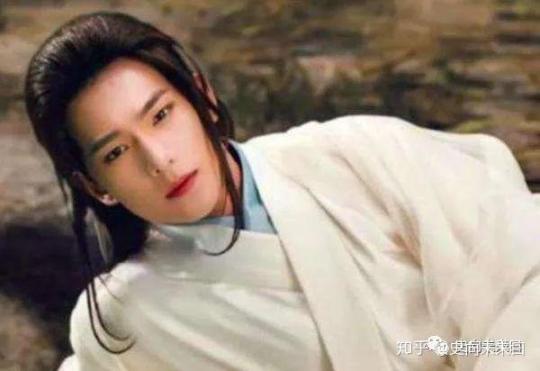
(Modern Chinese cinema representation of Lungyan Jun: historical Jiang Cheng’s beau and the man whose title became synonymous with gay porn for literally two thousand years and counting)
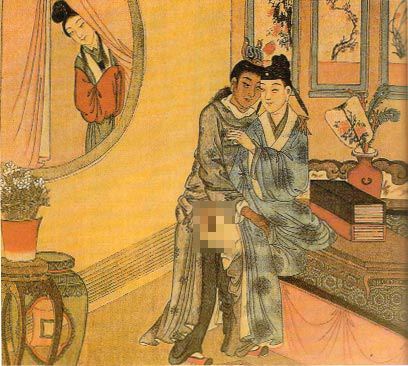
(Ancient gay porn featuring not-historical-Jiang-Cheng and not-Lungyang-jun. In ancient China, novels were written based on real concurrent events with names switched out. Pay close attention to the hair ornaments of our actors here! The one on the left is wearing a hair crown typically reserved for royal men, whereas the one on the right is wearing a cap reserved for male court officials)

Historical Wei Ying! By which I mean Lord Xinling Wei Wuji (modern Chinese game), the war hero who died of a broken heart because his big brother don’t wanna play with him no more.
Incidentally, Wei Wuji and his brother King Wei Anli were the first people in recorded history to own Tiger Tally (Hufu).
But I shall talk about all this ancient gay drama and the OG tiger tally another day (So long, historical Jiang Cheng! You are still a horrible brother, you little shit!).
2. Slavery System of Wei Jin Southern and Northern Dynasties Era. Wei Jin Era really is just Warring States Era Mark 2. War Harder!
That is to say, being of royal blood is not what it’s cracked up to be during this specific era. Wei Jin Northern and Southern Dynasties Era (also called the Six Dynasties Era) is kinda a special case in post-Qin-unification Chinese history for the simple fact that China was anything but unified during this period.
To understand this period, you have to look at the sheer brutality and the miraculous nature of Qin unification. Qin Shi Huang did something that nobody before him had ever done. He united hundreds of different ethnic groups through murder, violence, and a case of genocide here and there. He forced enemies that had been feuding against each other for literal centuries to become fellow countrymen. He razed temples to the ground. He tore down capitals. He burned books and then burned the men who read such books beside them. He erased entire languages and cultures and forged a single, united country out of all that. For all that he contributed to China, the title tyrant is not wrongly awarded to him.
But with such a strong, charismatic, forceful leader, you eventually have to face the big problem: their death. The Qin Dynasty really didn’t last long after Qin Shi Huang’s passing. The Han dynasty right after was even more short-lived. Some historians even called that dynasty a stillbirth. The thing that followed was a period of pure chaos and violence where differences and ethnic tension that had brewed throughout Qin and Han dynasties finally exploded.
Thus, was born the Wei Jin Northern and Southern Dynasties, where the previously united Empire fractured into various petty kingdoms warring against each other. At one point, there were sixteen petty kingdoms where a united empire once was. What followed were approximately three centuries of various ancient states, petty kingdoms, cultures, and ethnic groups killing, fucking, cannibalizing, marrying into each other, massacring each other, tearing, and mushing apart and into each other until they eventually became a much more homogenized cultural and racial amalgamation and arrived (with a minor hiccup at the Song dynasty, another very short-lived dynasty) at the Tang Dynasty, which was considered a golden age in Chinese history and lasted for four centuries.
So then, in an era like this, being a reigning royal is not that big of a deal as you may think it is. In fact, this specific era was known as the era where the Noble Houses and not Kings were the ones who held the real power. Yes, noble houses like the Wen, the Jiang, the Jin, the Nie, and the Lan. Because there was no effective central power, the historical counterparts of the Houses in MDZS held power that they wouldn’t in other dynasties. Not only did they own vast territories and held legal power over them, but they also charged tax brackets that were previously only charged by Emperors or Kings. They could gather army conscripts and organize their own armed forces.
In the novel MDZS, the cultivator Houses acted exactly like the historical Noble Houses during the real Wei Jin Northern and Southern Dynasties. They held massive territories and could exert certain levels of administrative and legal power over them. They held hunting rights, tax rights. In the novel, during the Sunshot campaigns, all cultivator houses started gathering conscripts and volunteers for their Sunshot war. And finally, under Jin Guangyao’s reign, they built massive military structures. This would be unthinkable in both the era before and after this one specific era.
Ah… going too far off the topic. I digress. The point is, being actual reigning kings during this era is really not what it seems, let alone being long-lost royals. Because being long-lost royals means your royal family probably already kicked the bucket in historical Chinese Game of Thrones… and that means… you are a slave.
Yep, slavery. During this time in ancient China, society was separated into a strict nine-ranked caste system. Depending on which rank a person was, they might have certain rights (and duties) and could do certain jobs, and enjoy some level of protection from the provincial government. But if you are low on this ranking scale, you are effectively… not a human at all, not in the eye of the law.
Indeed, the lower ranks of this caste system were effectively serfs, who, if they dared leave the territory of their lord, would open themselves up to slave cartels. For example: Jin Guangyao’s mom, Meng Si, during this era would be categorized as Jianren (賤人, lit: petty person, this is the insult Madam Yu used against Wang Lingjiao), an owned Jianren at that. This means that even if she quit the brothel and took young Meng Yao with her, her caste as Jianren would still remain… which means she and her son Meng Yao would be forbidden from official examinations, would not enjoy protection from the law, would not be able to own particular business, would not be able to buy and own properties, and could only do lowly, menial jobs reserved for Jianren… unless she could pay an exorbitant amount of money and favor to a local magistrate to have him create new documentations for her and push her up on the caste system. Should she run and leave the city where she was based in, without the right documentation, she would open herself and her son up to roving slave cartels in the unprotected territory between city-states. Once she fell into slavery, her status as a slave, alongside her son, would be effectively legal in the eyes of the law (what passed for it) at that time.
Slavery is legal during Wei Jin era. In fact, slavery in China was legal up until very recently, in the last century. It was accepted and practiced wide-spread.
By that same system, if you were a citizen of a city-state on the losing side of a war, you would also be effectively a slave. Under this sytem, entire cities and small kingdoms of people were enslaved. Indeed, this is how Qi Huang Wen branch including Wen Qing and Wen Ning were treated in the novel: as slaves of the losing side. Originally they were stationed at Ganquan 甘泉 until Jin Zixun came and forced Wen Ning and other Wen people to Qiongqi Path, which was owned by the Jin. Because they were effectively slaves, even when they did nothing wrong, no one stood up for them. No one but Wei Ying.
This is even pointed out when Wei Ying said in the novel that because they are Wen, so they are not humans. Is that what you mean? When he went to Qiongqi Path the first time. In the eye of Chinese society of that time, the Wen... really weren’t considered humans at all.
So the point is, even if Wei Ying is long-lost royalty, in the eyes of the people in MDZS, he would be effectively a slave or from slave blood. So, Madam Yu did actually have a point when she repeatedly insulted Wei Ying (and his father) and treated them as she would a slave. Because in the eye of society of that time, they were slaves. It didn’t matter how talented Wei Changzhe was or that he was married to the disciple of Baoshan Sanren, a peer of the founders of all 5 great houses, he was still a slave. It didn’t matter how talented Wei Ying was or that he was a war hero or that he spoke truth, because he came from lowly blood, because he had no House and no Clan behind them, anyone at all (Jin Zixun, Jin Zixuan, Jiang Cheng, effectively the entire cultivator world) would feel like they could push him around and insult him without fearing retaliations. In an era without law, if you are alone, then you are automatically guilty.
3. Real-life cultivators are actually super anti-authority anarchist hippies. Also, MDZS world is probably heading for cultivator’s Armageddon. Also, Lan Qiren is full of shit. Two of the three Founding Sages of Daoism (real-life basis of cultivation and xianxia) say so.
-To Be Continued (I’m tired. This is longer than I thought. I’ll complete this another day)-
122 notes
·
View notes
Text

打屁股的確是魏嬰的惡夢
7 notes
·
View notes
Text
魏徵
H:緯來育樂「開創盛世」,劇中李建死談及魏徵「是個人才,效主忠貞不二。」20250327W4
維基百科:
魏徵
隋末唐初政治人物
魏徵ㄓㄥ[註 1](580年—643年1月17日),字玄成,相州內黃縣(今河南省安陽市內黃縣)[1]人,祖籍鉅鹿郡下曲陽縣(今河北省晉州市),隋唐政治家,思想家,文學家和史學家,曾任諫議大夫、左光祿大夫,封鄭國公,諡文貞,以直諫敢言著稱,是中國史上最負盛名的諫臣,輔佐唐太宗創建「貞觀之治」的大業,被後人稱為「一代名相」。著有《隋書》序論,《梁書》、《陳書》、《齊書》的總論等。其言論多見《貞觀政要》。其中《諫太宗十思疏》為最著名並流傳下來的諫文表。
簡介
出生資訊: 西元 580 年,中國邢台市巨鹿縣
逝世: 西元 643 年,長安
子女: 魏叔玉�� 魏叔琬、 魏叔璘、 魏叔瑜
著作: 隋書、 九成宫醴泉銘: 唐、 新編魏徵集、 二十四史全譯/珍藏版/第23~26函/舊唐書: 珍藏版, …
(外) 曾祖父/母: 魏處、 魏彥
父母: 魏長賢、 Wei Wan
(外) 孫子/女: 魏華、 魏殷、 魏膺
維基文庫
新唐書列傳第二十二 魏徵
《列傳第二十二 魏徵》[查看正文] [修改] [查看歷史]
1 魏徵,字玄成,魏州曲城人。少孤,落魄,棄貲產不營,有大志,通貫書術。隋亂,詭為道士。武陽郡丞元寶藏舉兵應李密,以徵典書檄。密得寶藏書,輒稱善,既聞徵所為,促召之。徵進十策說密,不能用。王世充攻洛口,徵見長史鄭頲曰:「魏公雖驟勝,而驍將銳士死傷略盡;又府無見財,戰勝不賞。此二者不可以戰。若浚池峭壘,曠日持久,賊糧盡且去,我追擊之,取勝之道也。」頲曰:「老儒常語耳!」徵不謝去。2 
後從密來京師,久之未知名。自請安輯山東,乃擢秘書丞,馳驛至黎陽。時李勣尚為密守,徵與書曰:「始魏公起叛徒,振臂大呼,眾數十萬,威之所被半天下,然而一敗不振,卒歸唐者,固知天命有所歸也。今君處必爭之地,不早自圖,則大事去矣!」勣得書,遂定計歸,而大發粟饋淮安王之軍。3 
會竇建德陷黎陽,獲徵,偽拜起居舍人。建德敗,與裴矩走入關,隱太子引為洗馬。徵見秦王功高,陰勸太子早為計。太子敗,王責謂曰:「爾鬩吾兄弟,奈何?」答曰:「太子蚤從徵言,不死今日之禍。」王器其直,無恨意。4 
即位,拜諫議大夫,封鉅鹿縣男。當是時,河北州縣素事隱、巢者不自安,往往曹伏思亂。徵白太宗曰:「不示至公,禍不可解。」帝曰:「爾行安喻河北。」道遇太子千牛李志安、齊王護軍李思行傳送京師,徵與其副謀曰:「屬有詔,宮府舊人普原之。今復執送志安等,誰不自疑者?吾屬雖往,人不信。」即��而後聞。使還,帝悅,日益親,或引至臥內,訪天下事。徵亦自以不世遇,乃展盡底蘊無所隱,凡二百餘奏,無不剴切當帝心者。由是拜尚書右丞,兼諫議大夫。5 
左右有毀徵阿黨親戚者,帝使溫彥博按訊,非是。彥博曰:「徵為人臣,不能著形跡,遠嫌疑,而被飛謗,是宜責也。」帝謂彥博行讓徵。徵見帝,謝曰:「臣聞君臣同心,是謂一體,豈有置至公,事形跡?若上下共由茲路,邦之興喪未可知也。」帝矍然,曰:「吾悟之矣!」徵頓首曰:「願陛下俾臣為良臣,毋俾臣為忠臣。」帝曰:「忠、良異乎?」曰:「良臣,稷、契、咎陶也;忠臣,龍逢、比干也。良臣,身荷美名,君都顯號,子孫傅承,流祚無疆;忠臣,己嬰禍誅,君陷昏惡,喪國夷家,只取空名。此其異也。」帝曰:「善。」因問:「為君者何道而明,何失而暗?」徵曰:「君所以明,兼聽也;所以暗,偏信也。堯、舜氏闢四門,明四目,達四聰。雖有共,鮌,不能塞也,靖言庸違,不能惑也。秦二世隱藏其身,以信趙高,天下潰叛而不得聞;梁武帝信硃異,侯景向關而不得聞;隋煬帝信虞世基,賊遍天下而不得聞。故曰,君能兼聽,則奸人不得壅蔽,而下情通矣。」6 
鄭仁基息女美而才,皇后建請為充華,典冊具。或言許聘矣。徵諫曰:「陛下處臺榭,則欲民有楝宇;食膏粱,則欲民有飽適;顧嬪御,則欲民有室家。今鄭已約昏,陛下取之,豈為人父母意!」帝痛自咎,即詔停冊。7 
貞觀三年,以秘書監參豫朝政。高昌王曲文泰將入朝,西域諸國欲因文泰悉遣使者奉獻。帝詔文泰使人厭怛紇干迎之。徵曰:「異時文泰入朝,所過供擬不能具,今又加諸國焉,則瀕塞州縣以乏致罪者眾。彼以商賈來,則邊人為之利;若賓客之,中國蕭然耗矣。漢建武時,西域請置都護、送侍子,光武不許,不以蠻夷敝中國也。」帝曰:「善。」追止其詔。8 
於是帝即位四年,歲斷死二十九,幾至刑措,米斗三錢。先是,帝嘗嘆曰:「今大亂之後,其難治乎?」徵曰:「大亂之易治,譬饑人之易食也。」帝曰:「古不云善人為邦百年,然後勝殘去殺邪?」答曰:「此不為聖哲論也。聖哲之治,其應如響,期月而可,蓋不其難。」封德彞曰:「不然。三代之後,澆詭日滋。秦任法律,漢雜霸道,皆欲治不能,非能治不欲。徵書生,好虛論,徒亂國家,不可聽。」徵曰:「五帝、三王不易民以教,行帝道而帝,行王道而王,顧所行何如爾。黃帝逐蚩尤,七十戰而勝其亂,因致無為。九黎害德,顓頊征之,已克而治。桀為亂,湯放之;紂無道,武王伐之。湯、武身及太平。若人漸澆詭,不復返樸,今當為鬼為魅,尚安得而化哉!」德彞不能對,然心以為不可。帝納之不疑。至是,天下大治。蠻夷君長襲衣冠,帶刀宿衛。東薄海,南逾嶺,戶闔不閉,行旅不齎糧,取給於道。帝謂群臣曰:「此徵勸我行仁義,既效矣。惜不令封德彞見之!」9 
俄檢校侍中,進爵郡公。帝幸九成宮,宮御舍湋川宮下。僕射李靖、侍中王珪繼至,吏改館宮御以舍靖、珪。帝聞,怒曰:「威福由是等邪!何輕我宮人?」詔並按之。徵曰:「靖、珪皆陛下腹心大臣,宮人止後宮掃除隸耳。方大臣出,官吏諮朝廷法式;歸來,陛下問人間疾苦。夫官舍,固靖等見官吏之所,吏不可不謁也。至宮人則不然,供饋之餘無所參承。以此按吏,且駭天下耳目。」帝悟,寢不問。10 
後宴丹霄樓,酒中謂長孫無忌曰:「魏徵、王珪事隱太子、巢刺王時,誠可惡,我能棄怨用才,無羞古人。然徵每諫我不從,我發言輒不即應,何哉?」徵曰:「臣以事有不可,故諫,若不從輒應,恐遂行之。」帝曰:「弟即應,須別陳論,顧不得?」徵曰:「昔舜戒群臣:『爾無面從,退有後言。』若面從可,方別陳論,此乃後言,非稷、蒐所以事堯、舜也。」帝大笑曰:「人言徵舉動疏慢,我但見其嫵媚耳!」徵再拜曰:「陛下導臣使言,所以敢然;若不受,臣敢數批逆鱗哉!」11 
十年,為侍中。尚書省滯訟不決者,詔徵平治。徵不素習法,但存大體,處事以情,人人悅服。進左光祿大夫、鄭國公。多病,辭職,帝曰:「公獨不見金在鑛何足貴邪?善冶鍛而為器,人乃寶之。朕方自比於金,以卿為良匠而加礪焉。卿雖疾,未及��,庸得便爾?」徵懇請,數卻愈牢。乃拜特進,知門下省事,詔朝章國典,參議得失,祿賜、國官、防閤並同職事。12 
文德皇后既葬,帝即苑中作層觀,以望昭陵,引徵同升,徵孰視曰:「臣毛昏,不能見。」帝指示之,徵曰:「此昭陵邪?」帝曰:「然。」徵曰:「臣以為陛下望獻陵,若昭陵,臣固見之。」帝泣,為毀觀。尋以定五禮,當封一子縣男,徵請封孤兄子叔慈。帝愴然曰:「此可以勵俗。」即許之。13 
後幸洛陽,次昭仁宮,多所譴責。徵曰:「隋惟責不獻食,或供奉不精,為此無限,而至於亡。故天命陛下代之,正當兢懼戒約,奈何令人悔為不奢。若以為足,今不啻足矣;以為不足,萬此寧有足邪?」帝驚曰:「非公不聞此言。」退又上疏曰:14 
《書》稱「明德慎罰」,「惟刑之恤」。《禮》曰:「為上易事,為下易知,則刑不煩。」「上多疑,則百姓惑;下難知,則君長勞。」夫上易事,下易知,君長不勞,百姓不惑,故君有一德,臣無二心。夫刑賞之本,在乎勸善而懲惡。帝王所與,天下畫一,不以親疏貴賤而輕重者也。今之刑賞,或由喜怒,或出好惡。喜則矜刑於法中,怒則求罪於律外;好則鑽皮出羽,惡則洗垢索瘢。蓋刑濫則小人道長,賞謬���君子道消。小人之惡不懲,君子之善不勸,而望治安刑措,非所聞也。且暇豫而言,皆敦尚孔、老;至於威怒,則專法申、韓。故道德之旨未弘,而鍥薄之風先搖。昔州犁上下其手而楚法以敝,張湯輕重其心而漢刑以謬,況人主而自高下乎!頃者罰人,或以供張不贍,或不能從欲,皆非致治之急也。夫貴不與驕期而驕自至,富不與奢期而奢自至,非徒語也。15 
且我之所代,實在有隋。以隋府藏況今之資儲,以隋甲兵況今之士馬,以隋戶口況今之百姓,挈長度大,曾何等級焉!然隋以富強而喪,動之也;我以貧寡而安,靜之也。靜之則安,動之則亂,人皆知之,非隱而難見、微而難察也。不蹈平易之塗,而遵覆車之轍,何哉?安不思危,治不念亂,存不慮亡也。方隋未亂,自謂必無亂;未亡,自謂必不亡。所以甲兵亟動,徭役不息,以至戮辱而不悟滅亡之所由也,豈不哀哉!夫監形之美惡,必就止水;監『政之安危,必取亡國。《詩》曰:「殷鑒不遠,在夏后之世。臣願當今之動靜,以隋為鑒,則存亡治亂可得而知。思所以危則安矣,思所以亂則治矣,思所以亡則存矣。存亡之所在,在節嗜欲,省游畋,息靡麗,罷不急,慎偏聽,近忠厚,遠便佞而已。夫守之則易,得之實難。今既得其所難,豈不能保其所易?保之不固,驕奢淫泆有以動之也。16 
帝宴群臣積翠池,酣樂賦詩。徵賦《西漢》,其卒章曰:「終藉叔孫禮,方知皇帝尊。」帝曰:「徵言未嘗不約我以禮。」它日,從容問曰:「比政治若何?」徵見久承平,帝意有所忽,因對曰:「陛下貞觀之初,導人使諫。三年以後,見諫者悅而從之。比一二年,勉強受諫,而終不平也。」帝驚曰:「公何物驗之?」對曰:「陛下初即位,論元律師死,孫伏伽諫以為法不當死,陛下賜以蘭陵公主園,直百萬。或曰:『賞太厚。』答曰:『朕即位,未有諫者,所以賞之。』此導人使諫也。後柳雄妄訴隋資,有司得,劾其偽,將論死,戴胄奏罪當徒,執之四五然後赦。謂胄曰『弟守法如此,不畏濫罰。」此悅而從諫也。近皇甫德參上書言『修洛陽宮,勞人也;收地租,厚斂也;俗尚高髻,宮中所化也。』陛下恚曰:『是子使國家不役一人,不收一租,宮人無發,乃稱其意。』臣奏:『人臣上書,不激切不能起人主意,激切即近訕謗。』於時,陛下雖從臣言,賞帛罷之,意終不平。此難於受諫也。」帝悟曰:「非公,無能道此者。人苦不自覺耳!」17 
先是,帝作飛仙宮,徵上疏曰:18 
隋有天下三十餘年,風行萬里,威詹殊俗,一旦舉而棄之。彼煬帝者,豈惡治安、喜滅亡哉?恃其富強,不虞後患也。驅天下,役萬物,以自奉養,子女玉帛是求,宮宇臺榭是飾,徭役無時,干戈不休,外示威重,內行險忌,讒邪者進,忠正者退,上下相蒙,人不堪命,以致殞匹夫之手,為天下笑。聖哲乘機,拯其危溺。今宮觀臺榭,盡居之矣;奇珍異物,盡收之矣;姬姜淑媛,盡侍於側矣;四海九州,盡為臣妾矣。若能鑒彼所以亡,念我所以得,焚寶衣,毀廣殿,安處卑宮,德之上也。若成功不廢,即仍其��,除其不急,德之次也。不惟王業之艱難,謂天命可恃,因基增舊,甘心侈靡,使人不見德而勞役是聞,斯為下矣。以暴易暴,與亂同道。夫作事不法,後無以觀。人怨神怒,則災害生;災害生,則禍亂作;禍亂作,而能以身名令終鮮矣。19 
是歲,大雨,穀、洛溢,毀宮寺十九,漂居人六百家。徵陳事曰:20 
臣聞為國基於德禮,保於誠信。誠信立,則下無二情;德禮形,則遠者來格。故德禮誠信,國之大綱,不可斯須廢也。傳曰:「君使臣以禮,臣事君以忠。」「自古皆有死,民無信不立。」又曰:「同言而信,信在言前;同令而行,誠在令外。」然則言而不行,言不信也;令而不從,令無誠也。不信之言,不誠之令,君子弗為也。21 
自王道休明,綿十餘載,倉廩愈積,土地益廣,然而道德不日博,仁義不日厚,何哉?由待下之情,未盡誠信,雖有善始之勤,而無克終之美。故便佞之徒得肆其巧,謂同心為朋黨,告訐為至公,強直為擅權,忠讜為誹謗。謂之朋黨,雖忠信可疑;謂之至公,雖矯偽無咎。強直者畏擅權而不得盡,忠讜者慮誹謗而不敢與之爭。熒惑視聽,鬱於大道,妨化損德,無斯甚者。22 
今將致治則委之君子,得失或訪諸小人,是譽毀常在小人,而督責常加君子也。夫中智之人,豈無小惠,然慮不及遠,雖使竭力盡誠,猶未免傾敗,況內懷奸利,承顏順旨乎?故孔子曰:「君子而不仁者有矣,未有小人而仁者。」然則君子不能無小惡,惡不積無害於正;小人時有小善,善不積不足以忠。今謂之善人矣,復慮其不信,何異立直木而疑其景之曲乎?故上不信則無以使下,下不信則無以事上。信之為義大矣!23 
昔齊桓公問管仲曰:「吾欲使酒腐於爵,肉腐於俎,得無害霸乎?」管仲曰:「此固非其善者,然無害霸也。」公曰:「何如而害霸?」曰:「不能知人,害霸也;知而不能用,害霸也;用而不能任,害霸也;任而不能信,害霸也;既信而又使小人參之,害霸也。」晉中行穆伯攻鼓,經年而不能下,饋閑倫曰:「鼓之嗇夫,閑倫知之,請無疲士大夫,而鼓可得。」穆伯不應。左右曰:「不折一戟,不傷一卒,而鼓可得,君奚不為?」穆伯曰:「閑倫之為人也,佞而不仁。若使閑倫下之,吾不可以不賞,若賞之,是賞佞人也。佞人得志,是使晉國舍仁而為佞,雖得鼓,安用之!」夫穆伯,列國大夫,管仲,霸者之佐,猶能慎於信任,遠避佞人,況陛下之上聖乎?若欲令君子小人是非不雜,必懷之以德,待之以信,厲之以義,節之以禮,然後善善而惡惡,審罰而明賞,無為之化何遠之有!善善而不能進,惡惡而不能去,罰不及有罪,賞不加有功,則危亡之期或未可保。24 
帝手詔嘉答。於是,廢明德宮玄圃院賜遭水者。25 
它日,宴群臣,帝曰:「貞觀以前,從我定天下,間關草昧,玄齡功也。貞觀之後,納忠諫,正朕違,為國家長利,徵而已。雖古名臣,亦何以加!」親解佩刀,以賜二人。帝嘗問群臣:「徵與諸葛亮孰賢?」岑文本曰:「亮才兼將相,非徵可比。」帝曰:「徵蹈履仁義,以弼朕躬,欲致之堯、舜,雖亮無以抗。時上封者眾,或不切事,帝厭之,欲加譙黜,徵曰:「古者立謗木,欲聞己過。封事,其謗木之遺乎!陛下思聞得失,當恣其所陳。言而是乎,為朝廷之益;非乎,無損於政。」帝悅,皆勞遣之。26 
十三年,阿史那結社率作亂,雲陽石然,自冬至五月不雨,徵上疏極言曰:27 
臣奉侍帷幄十餘年,陛下許臣以仁義之道,守而不失;儉約樸素,終始弗渝。德音在耳,不敢忘也。頃年以來,浸不克終。謹用條陳,裨萬分一。28 
陛下在貞觀初,清凈寡欲,化被荒外。今萬里遣使,市索駿馬,並訪怪珍。昔漢文帝卻千里馬,晉武帝焚雉頭裘。陛下居常論議,遠希堯、舜,今所為,更欲處漢文、晉武下乎?此不克終一漸也。子貢問治人。孔子曰:「懍乎若朽索之馭六馬。」子貢曰:「何畏哉?」對曰:「不以道導之,則吾仇也,若何不畏!」陛下在貞觀初,護民之勞,煦之如子,不輕營為。頃既奢肆,思用人力,乃曰:「百姓無事則易驕,勞役則易使。」自古未有百姓逸樂而致傾敗者,何有逆畏其驕而為勞役哉?此不克終二漸也。陛下在貞觀初,役己以利物,比來縱欲以勞人。雖憂人之言不絕於口,而樂身之事實切諸心。無慮營構,輒曰:「弗為此,不便我身。」推之人情,誰敢復爭?此不克終三漸也。在貞觀初,親君子,斥小人。比來輕褻小人,禮重君子。重君子也,恭而遠之;輕小人也,狎而近之。近之莫見其非,遠之莫見其是。莫見其是,則不待間而疏;莫見其非,則有時而暱。暱小人,疏君子,而欲致治,非所聞也。此不克終四漸也。在貞觀初,不貴異物,不作無益。而今難得之貨雜然並進,玩好之作無時而息。上奢靡而望下樸素,力役廣而冀農業興,不可得已。此不克終五漸也。貞觀之初,求士如渴,賢者所舉,即信而任之,取其所長,常恐不及。比來由心好惡,以眾賢舉而用,以一人毀而棄,雖積年任而信,或一朝疑而斥。夫行有素履,事有成跡,一人之毀未必可信,積年之行不應頓虧。陛下不察其原,以為臧否,使讒佞得行,守道疏間。此不克終六漸也。在貞觀初,高居深拱,無田獵畢弋之好。數年之後,志不克固,鷹犬之貢,遠及四夷,晨出夕返,馳騁為樂,變起不測,其及救乎?此不克終七漸也。在貞觀初,遇下有禮,群情上達。今外官奏事,顏色不接,間因所短,詰其細過,雖有忠款,而不得申。此不克終八漸也。在貞觀初,孜孜治道,常若不足。比恃功業之大,負聖智之明,長慠縱欲,無事興兵,問罪遠裔。親狎者阿旨不肯諫,疏遠者畏威不敢言。積而不已,所損非細。此不克終九漸也。貞觀初,頻年霜旱,畿內戶口並就關外,攜老扶幼,來往數年,卒無一戶亡去。此由陛下矜育撫寧,故死不攜貳也。比者疲於徭役,關中之人,勞弊尤甚。雜匠當下,顧而不遣。正兵番上,復別驅任。市物襁屬於廛,遞子背望於道。脫有一穀不收,百姓之心,恐不能如前日之帖泰。此不克終十漸也。29 
夫禍福無門,惟人之召,人無釁焉,妖不妄作。今旱之災,遠被郡國,兇醜之孽,起於轂下,此上天示戒,乃陛下恐懼憂勤之日也。千載休期,時難再得,明主可為而不為,臣所以鬱結長嘆者也!30 
疏奏,帝曰:「朕今聞過矣,願改之,以終善道。有違此言,當何施顏面與公相見哉!方以所上疏,列為屏障,庶朝夕見之,兼錄付史官,使萬世知君臣之義。」因賜黃金十斤,馬二匹。31 
高昌平,帝宴兩儀殿,嘆曰:「高昌若不失德,豈至於亡!然朕亦當自戒,不以小人之言而議君子,庶幾獲安也。」徵曰:「昔齊桓公與管仲、鮑叔牙、寧戚四人者飲,桓公請叔牙曰:『盍起為寡人壽?』叔牙奉觴而起曰:『願公無忘在莒時,使管仲無忘束縛於魯時,使甯戚無忘飯牛車下時。』桓公避席而謝曰:『寡人與二大夫能無忘夫子之言,則社稷不危矣。』」帝曰:「朕不敢忘布衣時,公不得忘叔牙之為人也。」32 
帝遣使者至西域立葉護���汗,未還,又遣使齎金帛諸國市馬。徵曰:「今立可汗未定,即詣諸國市馬,彼必以為意在馬,不在立可汗。可汗得立,必不懷恩。諸蕃聞之,以中國薄義重利,未必得馬而先失義矣。魏文帝欲求市西域大珠,蘇則以為惠及四海,則不求自至;求而得之,不足貴也。陛下可不畏蘇則言乎!」帝遂止。33 
是後右僕射缺,欲用徵,徵讓,得不拜。皇太子承乾與魏王泰交惡,帝曰:「當今忠謇貴重無逾徵,我遣傅皇太子,一天下之望,羽翼固矣。」即拜太子太師。徵以疾辭,詔答曰:「漢太子以四皓為助,我賴公,其義也。公雖臥,可擁全之。」34 
十七年,疾甚。徵家初無正寢,帝命輟小殿材為營構,五日畢,並賜素褥布被,以從其尚。令中郎將宿其第,動靜輒以聞,藥膳賜遺無算,中使者綴道。帝親問疾,屏左右,語終日乃還。後復與太子臻至徵第,徵加朝服,拖帶。帝悲懣,拊之流涕,問所欲。對曰:「嫠不恤緯,而憂宗周之亡!」帝將以衡山公主降其子叔玉。時主亦從,帝曰:「公強視新婦!」徵不能謝。是夕,帝夢徵若平生,及旦,薨。帝臨哭,為之慟,罷朝五日。太子舉哀西華堂。詔內外百官朝集使皆赴喪,贈司空、相州都督,謚曰文貞,給羽葆、鼓吹、班劍四十人,陪葬昭陵。將葬,其妻裴辭曰:「徵素儉約,今假一品禮,儀物褒大,非徵志。」見許,乃用素車,白布幨帷,無塗車、芻靈。帝登苑西樓,望哭盡哀。晉王奉詔致祭。帝作文於碑,遂書之。又賜家封戶九百。35 
帝後臨朝嘆曰:「以銅為鑒,可正衣寇;以古為鑒,可知興替;以人為鑒,可明得失。朕嘗保此三鑒,內防己過。今魏徵逝,一鑒亡矣。朕比使人至其家,得書一紙,始半稿,其可識者曰:『天下之事,有善有惡,任善人則國安,用惡人則國弊。公卿之內,情有愛憎,憎者惟見其惡,愛者止見其善。愛憎之間,所宜詳慎。若愛而知其惡,憎而知其善,去邪勿疑,任賢勿猜,可以興矣。』其大略如此。朕顧思之,恐不免斯過。公卿侍臣可書之於笏,知而必諫也。」36 
徵狀貌不逾中人,有志膽,每犯顏進諫,雖逢帝甚怒,神色不徙,而天子亦為霽威。議者謂賁、��不能過。嘗上塚還,奏曰:「向聞陛下有關南之行,既辦而止,何也?」帝曰:「畏卿,遂停耳。」始,喪亂後,典章湮散,徵奏引諸儒校集秘書,國家圖籍粲然完整。嘗以《小戴禮》綜匯不倫,更作《類禮》二十篇,數年而成。帝美其書,錄寘內府。帝本以兵定天下,雖已治,不忘經略四夷也。故徵侍宴,奏《破陣武德舞》,則俯首不顧,至《慶善樂》,則諦玩無斁,舉有所諷切如此。37 
徵亡,帝思不已,登凌煙閣觀畫像,賦詩悼痛,聞者媢之,毀短百為。徵嘗薦杜正倫、侯君集才任宰相,及正倫以罪黜,君集坐逆誅,纖人遂指為阿黨;又言徵嘗錄前後諫爭語示史官褚遂良。帝滋不悅,乃停叔玉昏,而僕所為碑,顧其家衰矣。38 
遼東之役,高麗、靺鞨犯陣,李勣等力戰破之。軍還,悵然曰:「魏徵若在,吾有此行邪!」即召其家到行在,賜勞妻子,以少牢祠其墓,��立碑,恩禮加焉。39 
四子:叔玉、叔琬、叔璘、叔瑜。叔玉襲爵為光祿少卿。神龍初,以其子膺紹封。叔璘,禮部侍郎,武后時,為酷吏所殺。叔瑜,豫州刺史,善草隸,以筆意傅其子華及甥薛稷。世稱善書者「前有虞、褚,後有薛、魏」。華為檢校太子左庶子、武陽縣男。開元中,寢堂火,子孫哭三日,詔百官赴吊。徵五世孫謨。40 
謨,字申之,擢進士第,同州刺史楊汝士闢為長春宮巡官。文宗讀《貞觀政要》,思徵賢,詔訪其後,汝士薦為右拾遺。謨姿宇魁秀,帝異之。41 
邕管經略使董昌齡誣殺參軍衡方厚,貶漵州司戶,俄徙峽州刺史。謨諫曰:「王者赦有罪,唯故無赦。比昌齡專殺不辜,事跡暴章,家人銜冤,萬里投訴,獄窮罪得,特被矜貸,中外以為屈法。今又授刺史,復使治人,紊憲章,乖至治,不見其可。」有詔改洪州別駕。42 
御史中丞李孝本,宗室子,坐李訓事誅死,其二女沒入宮。謨上言:「陛下即位,不悅聲色,於今十年,未始採擇。數月以來,稍意聲伎,教坊閱選,百十未已,莊宅收市,沄沄有聞。今又取孝本女內之後宮,宗姓不育,寵��為累,傷治道之本,速塵穢之嫌。諺曰:『止寒莫若重裘,止謗莫若自修。』惟陛下崇千載之盛德,去一旦之玩好。」帝即出孝本女,詔曰:「乃祖在貞觀時,指事直言,無所避,每覽國史,朕與嘉之。謨為拾遺,屢有獻納。夫備灑埽於內,非曰聲妓,恤宗女之幼,不為漁取,然疑似之間,不可戶曉,謨辭深切,其惜我之失,不亦至乎?謨雖居位日淺,朕何愛一官,增直臣之氣,其以謨為右補闕。」43 
先是,帝謂宰相曰:「太宗得徵,參裨闕失,朕今得謨,又能極諫,朕不敢仰希貞觀,庶幾處無過之地。」教坊有工善為新聲者,詔授揚州司馬,議者頗言司馬品高,郎官、刺史迭處,不可以授賤工,帝意右之。宰相諭諫官勿復言,謨獨固諫不可,工降潤州司馬。荊南監軍呂令琛縱傔卒辱江陵令,觀察使韋長避不發,移內樞密使言狀。謨劾長任察廉,知監軍侵屈官司,不以上聞,私白近臣,亂法度,請明其罰。不報。44 
俄為起居舍人,帝問:「卿家書詔頗有存者乎?」謨對:「惟故笏在。」詔令上送。鄭覃曰:「在人不在笏。」帝曰:「覃不識朕意,此笏乃今甘棠。」帝因敕謨曰:「事有不當,毋嫌論奏。」謨對:「臣頃為諫臣,故得有所陳;今則記言動,不敢侵官。」帝曰:「兩省屬皆可議朝廷事,而毋辭也!」帝索起居注,謨奏:「古置左、右史,書得失,以存鑒戒。陛下所為善,無畏不書;不善,天下之人亦有以記之。」帝曰:「不然。我既嘗觀之。」謨曰:「向者取觀,史氏為失職。陛下一見,則後來所書必有諱屈,善惡不實,不可以為史,且後代何信哉?」乃止。45 
中尉仇士良捕妖民賀蘭進興及黨與治軍中,反狀且,帝自臨問,詔命斬囚以徇。御史中丞高元裕建言:「獄當與眾共之。刑部、大理,法官也,決大獄不與知,律令謂何?請歸有司。」未報。謨上言:「事系軍,即推軍中。如齊民,宜付府縣。今獄不在有司,法有輕重,何從而知?」帝停決,詔神策軍以官兵留仗內,餘付御史臺。臺憚士良,不敢異,卒皆誅死。擢諫議大夫,兼起居舍人、弘文館直學士,謨固讓不見可,乃拜。46 
始謨之���,李玨、楊嗣復實推引之。武宗立,謨坐二人黨,出為汾州刺史。俄貶信州長史。宣宗嗣位,移郢、商二州刺史。召授給事中,遷御史中丞,發駙馬都尉杜中立奸贓,權戚縮氣。俄兼戶部侍郎事,謨奏:「中丞,紀綱所寄,不宜雜領錢穀,乞專治戶部。」詔可。頃之,進同中書門下平章事。建言:「今天下粗治,惟東宮未立,不早以正人傅導之,非所以存副貳之重。」且泣下,帝為感動。自敬宗後,惡言儲嫡事,故公卿無敢開陳者。時帝春秋高,嫡嗣未辨,謨輔政,白發其端,朝議歸重。47 
會詹毘國獻象,謨以為非土性,不可畜,請還其獻。詔可。河東節度使李業殺降虜,邊部震擾,業內恃憑藉,人無敢言者,謨奏徙滑州。遷中書侍郎。大理卿馬曙有犀鎧數十首,懼而瘞之。奴王慶以怨告曙藏甲有異謀,按之無它狀,投曙嶺外,慶免。議者謂奴訴主,法不聽。謨引律固爭,卒論慶死。累遷門下侍郎,兼戶部尚書。48 
大中十年,以平章事領劍南西川節度使。上疾求代,召拜吏部尚書,因久疾,檢校尚書右僕射、太子少保。卒,年六十六,贈司徒。49 
謨為宰相,議事天子前,它相或委抑規諷,惟謨讜切無所回畏。宣宗嘗曰:「謨名臣孫,有祖風,朕心憚之。」然卒以剛正為令狐綯所忌,讒罷之。50 
贊曰:君臣之際,顧不難哉!以徵之忠,而太宗之睿,身歿未幾,猜譖遽行。始,徵之諫,累數十餘萬言,至君子小人,未嘗不反復為帝言之,以佞邪之亂忠也。久猶不免。故曰:「皓皓者易污,嶢嶢者難全」,自古所嘆云。唐柳芳稱「徵死,知不知莫不恨惜,以為三代遺直」。諒哉!謨之論議挺挺,有祖風烈,《詩》所謂「是以似之」者歟!

0 notes
Text
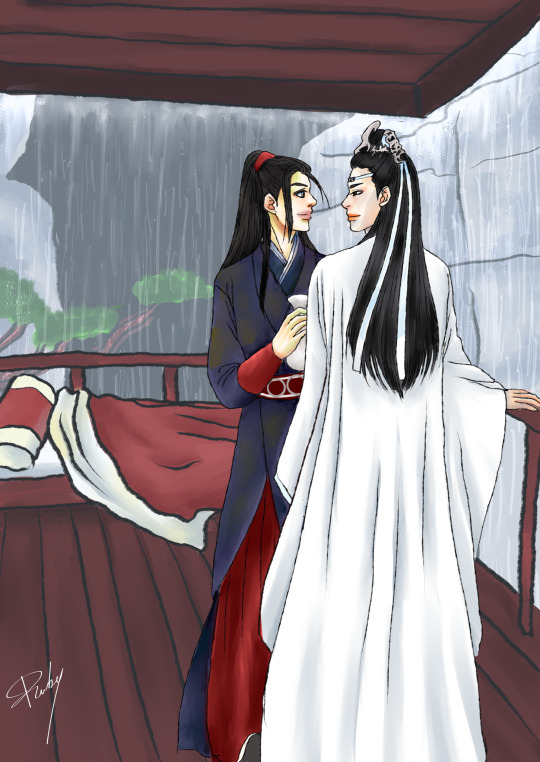
雨の日もまた楽しからずや
4 notes
·
View notes
Text
AI主播「人文新聞」城市傳媒 | 2024.12.22 | 城市生活報 http://www.citylifenews.net 報導影片 https://www.youtube.com/watch?v=5cJRBbnovPo
00:00 《桃園人文新聞 》、2024 大溪豆干節 BEAN FUN STYLE 熱鬧登場、 一年一度的大溪豆干節將於12月21日至22日在大溪多目標體育館旁廣場繽紛登場,桃園市政府觀光旅遊局以「BEAN FUN STYLE 繽紛大溪,豆樂風格」為主題,藉由黃豆的英文「BEAN」為靈感,融入諧音「been fun」,傳遞出趣味活力的全新品牌形象。活動安排上融合傳統、創新與國際視野等元素,打造結合地方特色與創新理念的「豆樂風格市集」、致敬經典的「鳳飛飛ERA復古扮裝派對」、大溪探店雙軌集章活動以及推動蔬食友善標章徵選活動,並廣邀內外旅客一同體驗大溪的文化底蘊與創新活力。
精彩生活,盡在城市!大家好,我是城市生活報城市人文新聞 AI主播 宥廷,今天為大家播報本週台灣各城市人文新聞。 00:51 《台北人文新聞 》、臺北和上海文化交流超越地域的界限、弭平誤解與隔閡、 2024臺北上海城市論壇歡迎晚宴在臺北圓山大飯店舉行,臺北市長蔣萬安在致詞時對上海市華源副市長、上海市代表團的來賓表達歡迎之意,並再次強調「雙城好、兩岸好」,臺北和上海的文化交流,超越地域的界限、弭平誤解與隔閡,也提醒著交流與和平的重要;上海市華源副市長在致詞時,也提到代表團今日下午參訪了廣慈博愛��區,體會到臺北市政府對基層社群治理的用心、用力,給予了老年人、嬰幼兒、殘疾人士等最需要關心群體的關愛和關懷,這些創新實踐也值得上海很好的學習和借鏡。 01:37 《台東人文新聞 》、「2025台東跨年晚會-東漂去旅行」、 跨年首選台東!「2025台東跨年晚會-東漂去旅行」精彩不斷,跨年超狂卡司全曝光,包括奪下本屆金曲獎歌王殊榮的MC HotDog熱狗、嘻哈天團頑童MJ116、金曲金馬殊榮洪佩瑜、金曲最佳專輯製作人李權哲、金曲獎最佳作詞人、最佳華語專輯熊仔、金曲最佳單曲製作人搖滾樂團「JADE」、凍齡女神蘇慧倫、金嗓天后葉璦菱、獲得金曲、金馬肯定的創作歌手王若琳Joanna Wang、創作才女魏如昀、創作才子許含光,超過10組天王天后人氣歌手將接力獻唱,更加碼祭出240秒具有張力及戲劇感的璀璨煙火迎接大家迎向美好的2025年。 02:25 《 彰化人文新聞 》、2024「龍」稻田中 嘗好米賞花田 體驗「田中米倉」的獨特魅力、 為推廣在地米食,田中鎮農會在望高瞭舉辦2024「龍」稻田中在地產業推廣活動暨輔導國產米糧創新行銷計畫,彰化縣長王惠美、田中鎮農會理事長陳明圳、常務監事葉文東、總幹事張瑞欣與各級民代、地方仕紳等人與會,現場還有在地農產推廣,滿滿人潮,王縣長等人共同邀請全國鄉親,在花開時節農曆年前,一起「龍」稻田中,品嘗田中在地好米,欣賞具特色的稻米裝置藝術綻放在花田中,拍照打卡,體驗「田中米倉」好山好水好人情的獨特魅力。 03:09 《苗栗人文新聞 》、客家文化與耶誕氛圍互相輝映 苗栗市「聲誕交響夜」驚艷全場、 苗栗市公所20晚在苗栗縣政府前舉辦苗栗市「聲誕交響夜」活動,縣長鍾東錦與苗栗市長余文忠及地方代表等一同出席盛會,現場燈光與音樂相互輝映,營造出濃厚的耶誕節慶氛圍。 03:28 《 南投人文新聞 》、2025清境星空派對跨年晚會、 清境農場跨年晚會以台灣最高海成跨年晚會為主軸,已執行多年,每年皆吸引上萬名眾前住參加。本次跨年晚會預計邀請藝人卡司羅美玲���妖嬌、蕭閎仁、卓義峯、開水小姐、宋德鶴等,以及在地原原民款手等帶來精彩歌舞表演,並搭配星空天文教育、環境永續等議題宣導,增加活動內容精采度,周邊並設有愛心義賣,亦同步推動周邊民宿、餐廳、農特產品業者,帶動周邊經濟。
感謝各位的觀賞,我們下次城市生活報,台灣各城市人文新聞,期望與您再見。
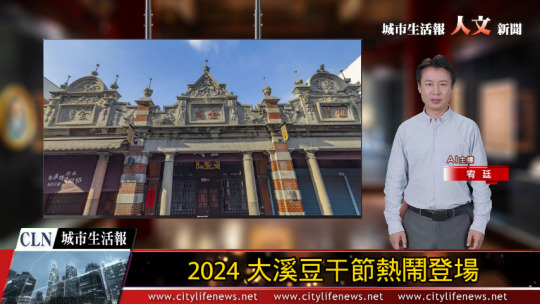
1 note
·
View note
Text
AI主播「人文新聞」城市生活報 | 2024.12.21 | 城市生活報 http://www.citylifenews.net 報導影片 https://www.youtube.com/watch?v=5cJRBbnovPo
00:00 《桃園人文新聞 》、2024 大溪豆干節 BEAN FUN STYLE 熱鬧登場、 一年一度的大溪豆干節將於12月21日至22日在大溪多目標體育館旁廣場繽紛登場,桃園市政府觀光旅遊局以「BEAN FUN STYLE 繽紛大溪,豆樂風格」為主題,藉由黃豆的英文「BEAN」為靈感,融入諧音「been fun」,傳遞出趣味活力的全新品牌形象。活動安排上融合傳統、創新與國際視野等元素,打造結合地方特色與創新理念的「豆樂風格市集」、致敬經典的「鳳飛飛ERA復古扮裝派對」、大溪探店雙軌集章活動以及推動蔬食友善標章徵選活動,並廣邀內外旅客一同體驗大溪的文化底蘊與創新活力。
精彩生活,盡在城市!大家好,我是城市生活報城市人文新聞 AI主播 宥廷,今天為大家播報本週台灣各城市人文新聞。 00:51 《台北人文新聞 》、臺北和上海文化交流超越地域的界限、弭平誤解與隔閡、 2024臺北上海城市論壇歡迎晚宴在臺北圓山大飯店舉行,臺北市長蔣萬安在致詞時對上海市華源副市長、上海市代表團的來賓表達歡迎之意,並再次強調「雙城好、兩岸好」,臺北和上海的文化交流,超越地域的界限、弭平誤解與隔閡,也提醒著交流與和平的重要;上海市華源副市長在致詞時,也提到代表團今日下午參訪了廣慈博愛園區,體會到臺北市政府對基層社群治理的用心、用力,給予了老年人、嬰幼兒、殘疾人士等最需要關心群體的關愛和關懷,這些創新實踐也值得上海很好的學習和借鏡。 01:37 《台東人文新聞 》、「2025台東跨年晚會-東漂去旅行」、 跨年首選台東!「2025台東跨年晚會-東漂去旅行」精彩不斷,跨年超狂卡司全曝光,包括奪下本屆金曲獎歌王殊榮的MC HotDog熱狗、嘻哈天團頑童MJ116、金曲金馬殊榮洪佩瑜、金曲最佳專輯製作人李權哲、金曲獎最佳作詞人、最佳華語專輯熊仔、金曲最佳單曲製作人搖滾樂團「JADE」、凍齡女神蘇慧倫、金嗓天后葉璦菱、獲得金曲、金馬肯定的創作歌手王若琳Joanna Wang、創作才女魏如昀、創作才子許含光,超過10組天王天后人氣歌手將接力獻唱,更加碼祭出240秒具有張力及戲劇感的璀璨煙火迎接大家迎向美好的2025年。 02:25 《 彰化人文新聞 》、2024「龍」稻田中 嘗好米賞花田 體驗「田中米倉」的獨特魅力、 為推廣在地米食,田中鎮農會在望高瞭舉辦2024「龍」稻田中在地產業推廣活動暨輔導國產米糧創新行銷計畫,彰化縣長王惠美、田中鎮農會理事長陳明圳、常務監事葉文東、總幹事張瑞欣與各級民代、地方仕紳等人與會,現場還有在地農產推廣,滿滿人潮,王縣長等人共同邀請全國鄉親,在花開時節農曆年前,一起「龍」稻田中,品嘗田中在地好米,欣賞具特色的稻米裝置藝術綻放在花田中,拍照打卡,體驗「田中米倉」好山好水好人情的獨特魅力。 03:09 《苗栗人文新聞 》、客家文化與耶誕氛圍互相輝映 苗栗市「聲誕交響夜」驚艷全場、 苗栗市公所20晚在苗栗縣政府前舉辦苗栗市「聲誕交響夜」活動,縣長鍾東錦與苗栗市長余文忠及地方代表等一同出席盛會,現場燈光與音樂相互輝映,營造出濃厚的耶誕節慶氛圍。 03:28 《 南投人文新聞 》、2025清境星空派對跨年晚會、 清境農場跨年晚會以台灣最高海成跨年晚會為主軸,已執行多年,每年皆吸引上萬名眾前住參加。本次跨年晚會預計邀請藝人卡司羅美玲、妖嬌、蕭閎仁、卓義峯、開水小姐、宋德鶴等,以及在地原原民款手等帶來精彩歌舞表演,並搭配星空天文教育、環境永續等議題宣導,增加活動內容精采度,周邊並設有愛心義賣,亦同步推動周邊民宿、餐廳、農特產品業者,帶動周邊經濟。
感謝各位的觀賞,我們下次城市生活報,台灣各城市人文新聞,期望與您再見。

1 note
·
View note
Text

兔兔魔法使 魏嬰:我轉~我轉~我轉轉轉~
31 notes
·
View notes
Text
光怪陸離
H:嘗鮮,是對食物而言。對事物的新奇體驗,以光怪陸離,五光十色,甚至五彩繽紛,五花八門。看一些奇幻異聞,鬼怪仙俠的古書。新鴛鴦蝴蝶「花花世界鴛鴦蝴蝶,在人間已是癲;何苦要上青天不如温柔同眠。」形容的很好,人間處處有桃花源,何苦想那青天上的仙境。美好的事物不必遠求,只在你我身邊周圍。
知足常樂得享天堂仙境「一花一世界,一木一浮生,一草一天堂,一葉一如來,一砂一極樂,一方一淨土,一笑一塵緣,一念一清靜。如果你不給自己煩惱,別人也永遠不可能給你煩惱。因為你自己的內心,你放不下。若能一切隨他去,便是人世間自在人。」20240816W5
網路字典
光怪陸離
音讀與釋義典故說明用法說明辨 識列印 加入筆記
字級設定小中大
成 語光怪陸離
釋 義「光怪」,離奇怪異的樣子。語出《吳書》。「陸離」,參差錯雜的樣子。#語出戰國楚.屈原〈離騷〉。「光怪陸離」形容現象離奇怪異,色彩參差錯雜。典故說明「光怪陸離」係由「光怪」及「陸離」二語組合而成。
「光怪」是出自《吳書》。孫堅家族的祖墳在富春城東,墳上屢次出現怪異的光景,上頭時常飄著五色雲彩,連綿數里不斷,吸引很多人前去觀看。凡是看過的鄉親父老都說,孫氏要興旺了!後來孫堅出生,果真長相不凡,生性闊達,擁有不凡的操守。
「陸離」則是出自〈離騷〉。戰國時楚人屈原,遭靳尚等人毀謗,被懷王放逐漢北時,作〈離騷〉表明忠貞愛國之心。文中,屈原因為無法解開對現實和理想之間的矛盾,於是上天下地找尋解脫之道。他幻想駕鸞凰、鳳鳥乘風飛升,翱遊天際。一路上有望舒、飛廉、鸞凰、雷師、鳳鳥、雲霓等眾多仙人及侍從伴隨,色彩繁雜而絢麗。後來這兩個典源被合用成「光怪陸離」,用來形容現象離奇怪異,色彩參差錯雜。用法說明
成語用法
成語釋義
光怪:光彩奇異;陸離:開卷參差。形容奇形怪狀,五顏六色。[1]
成語出處
戰國·楚·屈原《離騷》:“紛總總其離合兮,斑陸離其上下。”《三國志·吳志·孫堅傳》裴松之注引《吳書》:“冢上有光怪,雲氣五色,上屬於天,曼延數里。”[1]
解釋:
形容現象怪異、色彩繽紛。參見「光怪陸離」條。《孽海花》第八回:「見船上紮著無數五色的彩球,陸離光怪、紙醉金迷。」
五光十色
音讀與釋義典故說明用法說明辨 識列印 加入筆記
字級設定小中大
成 語五光十色注 音ㄨˇ ㄍㄨㄤ ㄕˊ ㄙㄜˋ漢語拼音wǔ guāng shí sè釋 義形容景色鮮麗複雜,光彩奪目。語本南朝梁.江淹〈麗色賦〉。後亦用「五光十色」比喻內容豐富,變化萬端。
△「五彩繽紛」典故說明「賦」是傳統文學體裁之一,形似散文,但內含詩的韻律,是一種介於詩歌與散文之間的文體。盛行於漢魏六朝,魏晉南北朝時,因應新興的駢偶文風而發展出「俳賦」,此體多採四六對仗的句式,講求嚴格的平仄音律,並喜用典故。江淹為當時著名作家,〈麗色賦〉即其作品之一,內容描繪一位絕色美女的容貌、姿儀。其中一段,文曰:「其始見也,若紅蓮鏡池;其少進也,如綵雲出崖,五光徘徊,十色陸離。」大意是:初見佳人,如見生長於無波如鏡之池中的紅蓮,佳人一動,則如絢爛的雲彩自崖間飄出,色彩鮮麗,燦爛奪目。短短數語,即生動呈顯了麗人的綽約風姿。後來「五光十色」這句成語就從這裡演變而出,用來形容景色鮮麗複雜,光彩奪目。亦用來比喻事物的內容豐富,變化萬端。用法說明一、
語義說明
形容景色鮮麗複雜,光彩奪目。
民俗,就是世代相傳的民間生活風俗。世界民俗,就是關於世界各地的民俗。
五花、八門各指古代兵法中的五行陣、八門陣。 後比喻形形色色、變化多端。 如:「這家超商的食品種類真是 五花八門 。」 《儒林外史》第四二回:「那小戲子一個個戴了貂裘,簪了雉羽,穿極新鮮的靠子,跑上場來,串了一個 五花八門 。」
光怪陸離偵探社
《光怪陸離偵探社》是連載於起點中文網的一部懸疑類網絡小説,作者是吾即正道。[1]
該小説講述了陸離面對一扇詭秘之門,門後邪惡低語,奇異生物蠢蠢欲動。怨念之眼、黏糊粉腦、黃衣觀察者、墨綠污泥等奇異存在競相登場,它們以各自的方式發出邀請,共赴一場瘋狂派對。陸離在誘惑與危險交織中,毅然決然地踏入未知領域。
博客來介紹:
巷說異聞錄:光怪陸離的民國軼事
作者:檀信介
語言:繁體中文
出版社:好讀
出版日期:2019/03/01
【奇幻又真實,是故事也是人生】
本書兼具歷史、名人、志怪、懸疑、推理等多種吸引人的閱讀元素於一身,還能了解到民國初年,民間許多不為人知的神異傳說和風俗習慣。
●深受喜愛的志怪故事,引起廣大歡迎與討論,給熱愛志怪小說的讀者帶來一場文化盛宴。
●腦洞大開的異聞怪談,天馬行空的奇異想像,感受與眾不同的故事閱讀體驗。
●深得中國傳統志怪小說精髓,描繪一個個詭異奇幻的世界,反映人間百��。
●魔幻詭譎的故事反映現實中人們對財、色、長生不老的癡求,極具諷刺意味。
【精彩故事】
〈斬龍角〉:清朝末年,亂世中仍保持桃花源般安靜祥和的袁寨,收留一位能掐會算的「靈卦張」,袁家的運數因此受到巨大影響……
〈既濟壺〉:北宋末年,汴梁城裡有位小韃子,踢得一腳好球,年過四十依然健美英俊。傳說其家中有個寶物「既濟壺」,因此得以青春不老、容顏永駐……
〈陰陽魚〉:明朝末年,張獻忠屠蜀,一隊難民發現一處世外桃源,偌大的村莊只有一對形影不離的男女。圍繞這對男女,譜寫一曲哀婉的亂世悲歌。
【導讀賞析】歷史作家、譯者/廖彥博
檀信介帶著讀者一頭闖進近代史恢弘大敘事裡的小角落,看看那些「魔神仔」如何在辛亥革命、日軍侵華、國共內戰裡存活下來,繼續魅惑人心。
收回
目錄
●破地獄
●斬龍角
●買竹籌
●賣鬼記
●斬鬼嬰
●金簪記
●既濟壺
●陰陽魚
【導讀賞析】近代史縫隙裡的魔神仔:《巷說異聞錄》/廖彥博
序
導讀賞析
近代史縫隙裡的魔神仔:《巷說異聞錄》
廖彥博(歷史作家、譯者、《一本就懂中國史》作者)
對中國大陸的讀者來說,民國是一個既陌生又熟悉的時代。
鴛鴦蝴蝶,旗袍馬褂,上海十里洋場,南京梧桐森森,我揮一揮衣袖,他達達的馬蹄,凡此種種,共同在影視作品裡構成人們心中對於民國風華的美好想像。可是民國也是神秘而落後的,甚至是迷信而妖魔橫行的。原因很簡單:不這麼著,很難突顯出「當今」橫掃一切牛鬼蛇神之後的現代和進步。
對台灣的讀者而言,民國則是一個既熟悉又陌生的時期(注意和前者的排序)。
鈔票硬幣上、公家文書上、報紙刊頭上,民國還是進行式,就在我們生活呼吸之中。可是民國也是截然兩分的:屬於歷史的那一大段,曾經顏色鮮明的、氣壯山河的存在過的民國歲月,四海歸心、堅苦卓絕的激戰年代,大多數台灣人已經不復記憶。
檀信介的《巷說異聞錄》替我們把既熟悉又陌生的歷史連接起來,而且還開啟了一扇魔幻又真實的觀景窗。中國文學的傳統裡,一直有著「志怪文學」的傳統。《山海經》以降,漢晉的《淮南子》、《搜神記》,唐傳奇、宋元話本、明清筆記小說,我們在荒山野嶺,感覺到陰風陣陣,或是捅破紙窗,看見女鬼畫皮,不管你的出身籍貫、政治立場,相信文化基因裡都有著妖怪活躍的身影。
而檀信介則帶讀者一頭闖進近代史恢弘大敘事裡的小角落,看看那些「魔神仔」如何在辛亥革命、日軍侵華、國共內戰裡存活下來,繼續魅惑人心。故事光怪迷離,看官們不禁眼花撩亂,可是驚魂甫定,卻又嘖嘖稱奇:誰能說這些「魔神仔」不存在?
《巷說異聞錄》由〈破地獄〉、〈斬龍角〉、〈買竹籌〉、〈賣鬼記〉等幾則故事組成,故事的舞台,正是清末到民國、抗戰勝利那段熟悉又陌生的歲月,幾個歷史上響噹噹的大人物,比方做過大總統、也登基當過八十三天皇上的袁世凱,還有我們台灣讀者算是相當熟悉的「蔣故總統經國先生」,在故事裡也出奇不意,客串亮相。看他們出場的時機,扮演的角色,起到的作用,一定會讓讀者們會心一笑。
留學蘇聯、篤信唯物主義的「太子」蔣經國,如何運用起茅山道術,去摧破汪精衛政權的秘密金庫?又怎麼會引來一場多年無法偵破的連續命案呢?且讓我們翻開這部《巷說異聞錄》。
維基文庫
麗色賦
作者:富嘉謨 唐本作品收錄於《全唐文/卷0235》
姊妹計劃: 數據項
客有鴻盤京劇者,財力雄倬,誌圖豐茂,繡轂生塵,金羈照路。清江可涉,綠淇始度,拾蕊歲滋,摘芳奇樹。錦席夜陳,苕華嬌春,瑤台吐鏡。翠樓初映,俄而世姝即,國容進,疑自持兮動盼,目爛爛兮昭振。金為釵兮十二行,錦為履兮五文章,聲珊珊兮佩明璫,意洋洋兮若有亡,蹁躚兮延佇,招吾人兮由房。凝釭吐輝兮明燭流注,願言始勤兮四坐相顧,時峨峨而載笑,唯見光氣之交騖。夜如何其夜遲遲,美人至止兮皎素絲,秉明心兮無他期。引鄉何其夜已半,美人至止兮青玉案,之死矢兮無彫換。既而河漢欲傾,琴瑟且鳴,餘弄未盡,清歌含韻。歌曰:「涉綠水兮采紅蓮,水漫漫兮花田田。舟容與兮白日暮,桂水浮兮不可度。憐彩翠於幽渚,悵妖妍於早露。」於是覽物遷跡,徘徊不懌,起哀情於碧湍,指盛年於光隙,擊節浩歎,解珮嘉客。是時也,楊雄始壯,相如未病,複有鄒、枚,藉藉荀令。鹹娛座客,嬉妙情,灑豪翰,動和聲。使夫燕姬趙女,衛豔陳娥,東門相送,上宮經過。碧雲合兮金閨暮,紅埃起兮彩騎多,價奪十城之美,聲曼獨立之歌,況複坐弦酌而對瑤草,當盛明而謂何?
百度百科
新鴛鴦蝴蝶夢創作背景
在1992年10月的一個晚上,黃安抱着女兒到樓下去散步,突然他聽到一段旋律,黃安趕緊回家迅速記下了這段旋律。這是一段中國五聲音階的旋律,琅琅上口,於是便有了《新鴛鴦蝴蝶夢》的原始素材。有了曲子後還需有詞相配才可以。黃安覺得那段旋律頗有古風,於是他翻開唐詩,一翻便翻到李白與杜甫的詩。在李白的《宣州謝朓樓餞別校書叔雲》中,有這樣一段描述,“棄我去者,昨日之日不可留,亂我心者,今日之日多煩憂,抽刀斷水水更流,舉杯消愁愁更愁,人生在世不稱意,明朝散發弄扁舟”,黃安僅是稍加修改便有了《新鴛鴦蝴蝶夢》的第一段歌詞。[2]
歌曲歌詞
昨日像那東流水
離我遠去不可留
今日亂我心多煩憂
抽刀斷水水更流
舉杯消愁愁更愁
明朝清風四飄流
由來只有新人笑
有誰聽到舊人哭
愛情兩個字好辛苦
是要問一個明白
還是要裝作糊塗
知多��少難知足
看似個鴛鴦蝴蝶
不應該的年代
可是誰又能擺脱
人世間的悲哀
花花世界鴛鴦蝴蝶
在人間已是癲
何苦要上青天
不如温柔同眠
昨日像那東流水
離我遠去不可留
今日亂我心多煩憂
抽刀斷水水更流
舉杯消愁愁更愁
明朝清風四飄流
由來只有新人笑
有誰聽到舊人哭
愛情兩個字好辛苦
是要問一個明白
共2張
歌曲MV
還是要裝作糊塗
知多知少難知足
看似個鴛鴦蝴蝶
不應該的年代
可是誰又能擺脱人世間的悲哀
花花世界鴛鴦蝴蝶
在人間已是癲
何苦要上青天
不如温柔同眠
看似個鴛鴦蝴蝶
不應該的年代
可是誰又能擺脱人世間的悲哀
花花世界鴛鴦蝴蝶
在人間已是癲
何苦要上青天
不如温柔同眠。
博客來介紹:
知足常樂
作者:林高樂
語言:繁體中文
出版社:大拓文化
出版日期:2011/09/08
內容簡介
一花一世界,一木一浮生,一草一天堂,一葉一如來,一砂一極樂,一方一淨土,一笑一塵緣,一念一清靜。
如果你不給自己煩惱,別人也永遠不可能給你煩惱。因為你自己的內心,你放不下。
若能一切隨他去,便是人世間自在人。
禪不清高,穿衣吃飯是禪;
禪不脫俗,柴米油鹽是禪;
禪不深奧,世間萬物皆是禪。
禪,不是要我們放棄責任,出家以求自我解脫。一個人身在俗世,勇於承擔,保持佛心,就是禪;即使身處鬧市,只要心中寧靜,就是佛。
收回
目錄
第一章 一花一世界,一木一浮生
昔時佛祖拈花,惟迦葉微笑,既而步往極樂。從一朵花中便能悟出整個世界,得升天堂,佛祖就是佛祖,誰人能有這樣的境界?佛曰:一花一世界,一木一浮生,一草一天堂,一葉一如來,一砂一極樂,一方一淨土,一笑一塵緣,一念一清靜。這一切都是一種心境。參透這些,一花一木便是整個世界,而整個世界,整個人生也便空如花木。
1.眾生平等
2.慧能��徒
3.達摩是個老和尚
4.老和尚是寶
5.生命如琴弦
6.俗眼無珠
7.聖人無名
8.物極必反,盛極必衰
9.淡泊以明志
10.人生的底線
11.美在靈魂
12.一切皆同
13.玉缽
14.一個無法滿足的人
15.財富、成功、愛
第二章 緣起即滅,緣生已空
佛說:修百世方可同舟渡,修千世方能共枕眠。前生五百次的凝眸,換今生一次的擦肩。今生的一次邂逅,定然孕育前世太多甜蜜或痛苦的回憶。萬發緣生,皆系緣分!偶然的相遇,驀然回首,注定了彼此的一生,只為了眼光交會的剎那。
1.生與死
2.怨也是緣
3.境由心生
4.一切都是緣,要學會包容
5.愛是生命最好的養料
6.心中有路
7.緣起緣滅,泥濘留痕
8.人生有個檸檬就做杯檸檬汁
9.不要為明天的落葉操心
10.因緣
11.一切皆隨緣
第三章 大悲無淚,大悟無言,大笑無聲
生活不一定是轟轟烈烈的,有時平平淡淡才是真!
功名利祿樣樣俱全,固然求之不得,但現實生活中的大部分人,還是與其不擇手段,換取名利雙全,不如平平淡淡,粗茶淡飯來得更真真切切。
1.超越生死的境界
2.忘我,不被世俗所束
3.普化圓寂
4.愛的回報
5.沒有什麼不能做
6.沉默人生最可貴
7.弦緊弓斷,學會放鬆
8.自然是福,自然最美
9.從容是一種人生智慧
10.人生如過客
11.隨遇而安
12.享受平淡的生活
13.過程比結果重要
14.真正快樂的生活
15.幸福是一種感覺
16.生活的境界——順其自然
第四章 心不動,人不妄動,不動則不傷
人生在世如身處荊棘之中,心不動,人不妄動,不動則不傷;如心動則人妄動,傷其身痛其骨,於是體會到世間諸般痛苦。
充滿誘惑的塵世間,你的心是否堅不可摧,是否能抵擋得了這一重又一重的衝擊?
1.天堂地獄一念間
2.放下包袱
3.保持一顆寧靜的心
4.快樂是自己的事
5.放下是一條解脫之道
6.「偷」來快樂
7.愛的責任
8.心境不同
收回
序
前言
一方古剎、一尊佛像、一襲衲衣;化緣為生、清貧孤獨、無慾無求,青燈木魚常伴左右。世人心中禪者的佛門生活就是這樣的不食人間煙火。
如果你也這麼想,那麼,就大錯特錯了。
佛曰:「普度眾生。」眾生為何意?很簡單,就是全人類。自從釋迦牟尼創立佛教到達摩初祖歷盡艱難曲折將佛教帶入中國的那一天起,它就與我們的生活息息相關。
禪不清高,穿衣吃飯是禪;
禪不脫俗,柴米油鹽是禪;
禪不深奧,世間萬物皆是禪。
禪,不是要我們放棄責任,出家以求自我解脫。一個人身在俗世,勇於承擔,保持佛心,就是禪;即使身處鬧市,只要心中寧靜,就是佛。
沒有錢的時候,我們煩惱;有了錢,我們空虛。——窮得只剩下錢。
沒有愛情的時候,我們失落;有了愛情,叫人頭疼。——愛情價雖高,自由更可貴。
不出名沮喪,出了名鬱悶。——人怕出名,豬怕壯。
近在我們身邊的禪,能幫你化解所有這些問題。
菩薩心腸,有容乃大。
再厚的寒冰,太陽出來都會溶化;再冷的飯菜,柴火點燃都會煮熟。要做太陽,溫暖別人;要做柴火,成熟別人。遇事學會換位思考,你會發現,你的人緣會越好,你也會越快樂。
知足常樂,無慾則剛。
0 notes
